|
|
|
Sort Order |
|
|
|
Items / Page
|
|
|
|
|
|
|
| Srl | Item |
| 1 |
ID:
150416
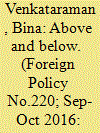

|
|
|
| 2 |
ID:
046023


|
|
|
|
|
| Publication |
New York, Vintage books, 1996.
|
| Description |
x, 356p.Pbk
|
| Standard Number |
0679772537
|
|
|
|
|
|
|
|
|
|
|
|
Copies: C:1/I:0,R:0,Q:0
Circulation
| Accession# | Call# | Current Location | Status | Policy | Location |
| 047037 | 940.27/HOB 047037 | Main | On Shelf | General | |
|
|
|
|
| 3 |
ID:
122346
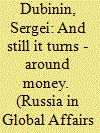

|
|
|
|
|
| Publication |
2013.
|
| Summary/Abstract |
It is the common wealth, or the accumulated and permanently growing public wealth that has real significance. A growing national economy as such is a factor of attraction. Broadening markets promise lucrative contracts to any economic partner.
|
|
|
|
|
|
|
|
|
|
|
|
|
|
|
|
| 4 |
ID:
138176
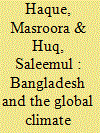

|
|
|
|
|
| Summary/Abstract |
The yearly international climate change negotiations, also known as Conferences of Parties (COPs), are large and formidable affairs. Under the aegis of the United Nations Framework Convention on Climate Change (UNFCCC), government ministers, bureaucrats, and other delegates from developed and developing countries come to hash out compromises. Civil society organizations, activists, researchers, scientists, UN officials, journalists, students, and private-sector leaders come from all over the world to protest, network, and exchange ideas.
|
|
|
|
|
|
|
|
|
|
|
|
|
|
|
|
| 5 |
ID:
152590
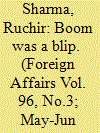

|
|
|
|
|
| Summary/Abstract |
The global recovery from the Great Recession of 2009 has just entered its eighth year and shows few signs of fading. That should be cause for celebration. But this recovery has been an underwhelming one. Throughout this period, the global economy has grown at an average annual pace of just 2.5 percent—a record low when compared with economic rebounds that took place in the decades after World War II. Rather than rejoicing, then, many experts are now anxiously searching for a way to push the world economy out of its low-growth trap. Some economists and investors have placed their hopes on populists such as U.S. President Donald Trump, figuring that if they can make their countries’ economies grow quickly again, the rest of the world might follow along.
|
|
|
|
|
|
|
|
|
|
|
|
|
|
|
|
| 6 |
ID:
048418
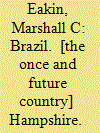

|
|
|
|
|
| Publication |
Hampshire, macmillan Press, 1997.
|
| Description |
xvi, 301p.hbk
|
| Standard Number |
0333694252
|
|
|
|
|
|
|
|
|
|
|
|
Copies: C:1/I:0,R:0,Q:0
Circulation
| Accession# | Call# | Current Location | Status | Policy | Location |
| 041344 | 981/EAK 041344 | Main | On Shelf | General | |
|
|
|
|
| 7 |
ID:
125155
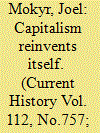

|
|
|
|
|
| Publication |
2013.
|
| Summary/Abstract |
The economics of a world of information and automation is radically different from that of a world of wheat, steel, and railroads.
|
|
|
|
|
|
|
|
|
|
|
|
|
|
|
|
| 8 |
ID:
117220
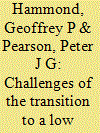

|
|
|
|
|
| Publication |
2013.
|
| Summary/Abstract |
Electricity generation presently contributes approximately 30% of United Kingdom (UK) carbon dioxide (CO2) emissions (Alderson et al., 2012 and Parliamentary, 2007), the principal 'greenhouse gas' (GHG) having an atmospheric residence time of about 100 years (Hammond, 2000). This share mainly arises from the use of fossil fuel (coal and natural gas) combustion for this purpose. Changes in atmospheric concentrations of GHGs affect the energy balance of the global climate system. Human activities have led to quite dramatic increases since 1950 in the 'basket' of GHGs incorporated in the Kyoto Protocol; concentrations have risen from 330 ppm to about 430 ppm currently (IPCC, 2007). Prior to the first industrial revolution in the 18th Century the atmospheric concentration of 'Kyoto gases' was only some 270 ppm. The cause of the observed rise in global average near-surface temperatures over the second half of the 20th Century has been a matter of dispute and controversy. But the most recent (2007) scientific assessment by the Intergovernmental Panel on Climate Change (IPCC) states with 'very high confidence' that humans are having a significant impact on the global warming (IPCC, 2007). They argue that GHG emissions from human activities trap long-wave thermal radiation from the Earth's surface in the atmosphere (not strictly 'greenhouse' phenomena), and that these are the main cause of rises in climatic temperatures. In order to mitigate anthropogenic climate change, the Royal Commission on Environmental Pollution in the UK (RCEP, 2000) recommended at the turn of the Millennium a 60% cut in UK CO2 emissions by 2050. The British Government subsequently set a tougher, legally binding target of reducing the nation's CO2 emissions overall by 80% by 2050 in comparison to a 1990 baseline ( Department of Trade and Industry [DTI], 2007 and Climate, 2008).
|
|
|
|
|
|
|
|
|
|
|
|
|
|
|
|
| 9 |
ID:
098080
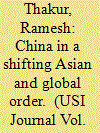

|
|
|
| 10 |
ID:
182811
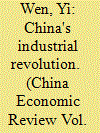

|
|
|
|
|
| Summary/Abstract |
In “The Industrial Structure of Production: An Outline of a Research Program,” Ronald Coase and Ning Wang (2001) made a plea for a new economic research program that can go beyond the Arrow-Debreu framework and explain China's miraculous rise. They point out that the greatest trouble with the Arrow-Debreu framework lies in its inability to explain production. In this article I will push this insight further to shed new light on why and how production, or mass production in particular, emerged and mushroomed in the 18th–19th century England, the 19th–20th century United States, and 20th-21st century China but not in other parts of the world with similar geo-developmental conditions such as the Netherlands, Mexico, or India. My central thesis is that production or firms emerge in response to market demand, yet the so-called “market” is itself a fundamental public good that must be created by a development state instead of the “invisible hand.” Therefore, the lack of industrialization in any nation seems on the surface due to the lack of mass supply, but is in fact due to the lack of a mass market, which in turn is due to the lack of powerful and strong-willed market creators.
|
|
|
|
|
|
|
|
|
|
|
|
|
|
|
|
| 11 |
ID:
110147
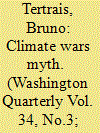

|
|
|
| 12 |
ID:
140113
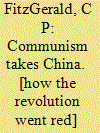

|
|
|
|
|
| Publication |
New York, British Commonwealth and American Heritage Press, 1971.
|
| Description |
127p.hbk
|
|
|
|
|
|
|
|
|
|
|
|
Copies: C:1/I:0,R:0,Q:0
Circulation
| Accession# | Call# | Current Location | Status | Policy | Location |
| 007845 | 951/FIT 007845 | Main | On Shelf | General | |
|
|
|
|
| 13 |
ID:
050216
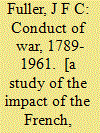

|
|
|
|
|
| Publication |
Dehradun, Natraj Publishers, 2003.
|
| Description |
352p.
|
| Standard Number |
818158001X
|
|
|
|
|
|
|
|
|
|
|
|
Copies: C:1/I:0,R:0,Q:0
Circulation
| Accession# | Call# | Current Location | Status | Policy | Location |
| 047506 | 355.0215/FUL 047506 | Main | On Shelf | General | |
|
|
|
|
| 14 |
ID:
118406
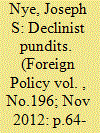

|
|
|
| 15 |
ID:
109111
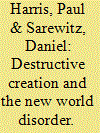

|
|
|
| 16 |
ID:
129243
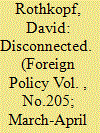

|
|
|
|
|
| Publication |
2014.
|
| Summary/Abstract |
The fabric of civilization is being rewoven around us. The very nature of life, work, and society is changing so profoundly that we are approaching a moment at which our old ways of thinking about the structures that sustain us may be seen as obsolete. This happens periodically throughout history -- think of the Renaissance, the Reformation, the Enlightenment, and the Industrial Revolution. Such eras often produce turmoil or upheaval, until leaders emerge who are able to help shape a new order for a new age.
The question today is whether our leaders are up to the challenge. Given their lack of grounding in the world's most pressing scientific and technological issues, I fear many, if not most, are not. Formerly disenfranchised populations are increasingly connecting to telecom, Internet, and other services. For instance, mobile-phone penetration was estimated to have surpassed 80 percent in Africa in the first quarter of 2013, according to figures published in 2012 by ABI Research. What's more, it is growing faster in Africa than anywhere else in the world. And though smartphone penetration in Africa is just 20 percent -- pretty near global levels -- it is expected to explode in the next few years.
|
|
|
|
|
|
|
|
|
|
|
|
|
|
|
|
| 17 |
ID:
130802
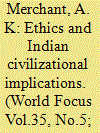

|
|
|
|
|
| Publication |
2014.
|
| Summary/Abstract |
The major civilizations of in human history have been associated with the major religious systems. Some
3,000 years ago Zoroastrianism was the religion of the "glory of ancient Persia," - the Persia that conquered" Babylon, Palestine, Egypt, and the Greek city-states. A few centuries later Judaism was the basis of Hebrew culture, which some philosophers such as Karl Jaspers regards as the greatest in history. And Jewish law has formed the I basis of common law and jurisprudence in countries all over the world. Western culture, until the rise of modem science, was dominated by Christianity. The teachings_ of Islam that burst upon world stage some 1400 years a go preserved and developed the Hellenistic heritage and gave algebra and other sciences. It was probably the greatest civilization the world had seen until the rise of the - Industrial Revolution began to transform Western culture. Today, the tumult of our age of transition is characteristic of the impetuosity and irrational instincts of youth. its follies, its prodigality, its pride, its self- assurance. its rebelliousness, and contempt of discipline.
|
|
|
|
|
|
|
|
|
|
|
|
|
|
|
|
| 18 |
ID:
094382
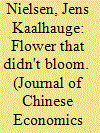

|
|
|
|
|
| Publication |
2010.
|
| Summary/Abstract |
This paper throws light on the question: why did the industrial revolution happen in the West and not in China? The key to an understanding of the development of China's civilization lies in the way China historically has been characterized by a peculiar 'freeze' of the cultural-political axis of societal differentiation. It's most direct manifestation was that of a monolith state. This had implications for the cognitive matrix of society, where a modern scientific system never developed, while at the same time China's rich sources of inventions were often poorly institutionalized. These flaws were also manifest in the weakness of Chinese civil society. Historically, this development can be traced back to the Shang dynasty yet these processes reached a crystallizing moment in the Qin dynasty. In the case of Europe, two seed-bed societies, the Greek and the Germanic tribes, played the key roles in safeguarding Europe's trajectory. One essential prerequisite in this process is the lack of cultural and political hegemony characterizing Europe's history. By this token, the fall of the Roman Empire and the rise of a system of fragmented Germanic kingdoms in the initial years of the Middle Ages were fundamental prerequisites for Europe's road toward an industrial revolution.
|
|
|
|
|
|
|
|
|
|
|
|
|
|
|
|
| 19 |
ID:
175947
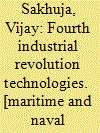

|
|
|
|
|
| Publication |
New Delhi, Pentagon Press and VIF, 2021.
|
| Description |
xxiii, 163p.Hbk
|
| Standard Number |
9789390095193
|
|
|
|
|
|
|
|
|
|
|
|
Copies: C:1/I:0,R:0,Q:0
Circulation
| Accession# | Call# | Current Location | Status | Policy | Location |
| 059937 | 359.07/SAK 059937 | Main | On Shelf | General | |
|
|
|
|
| 20 |
ID:
116430
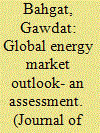

|
|
|
|
|
|
|
|